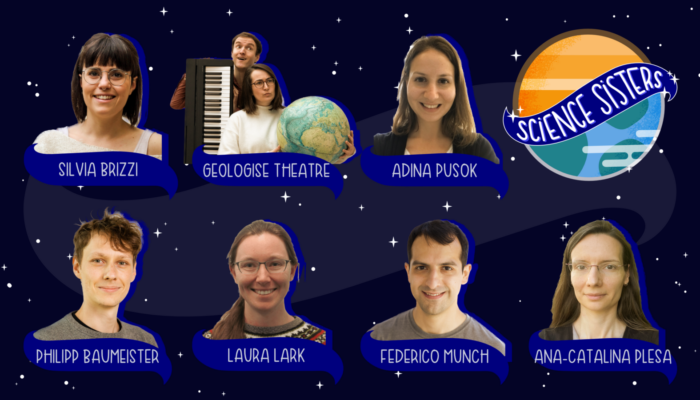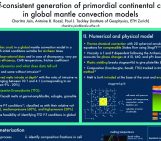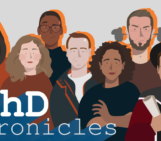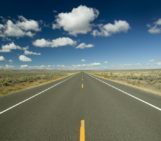
Science Sisters is a lighthearted interview series where Iris van Zelst (postdoc at the German Aerospace Center) chats with lots of different people (with a focus on – but not limited to – women in science) to make some sense of the academic world. Filled with laughter and silliness, it explores different career paths, academic life, soft skills, and current issues in academia. At 15 to 20 minutes in length, you can see it as a supershort seminar where you won’t fall asleep and can engage in some guilt-free, entertaining procrastination. Hopefully, it will make you laugh and maybe you’ll accidentally learn something in the process.
After Season 1 (check out this previous blog post!), Season 2 of Science Sisters has been in the making for almost two years. And this time, Iris is not making Science Sisters alone! Marina Cano Amoros (PhD student at the German Aerospace Center) edits the videos and Hinna Shivkumar (PhD student at the University of Amsterdam) writes the video descriptions and captions (and has therefore also written the majority of the blog post below). In this new season we discuss topics such as postdoc hopping (Iris really cannot get over the horrors of this phase of her career), outreach via theatre shows (bring the pizzazz, baby!), publishing, feeling incompetent (don’t we all?), astronaut training (how cool is this?!), toxic academia, and how to build your own research group.
We are looking for guests for the third season, so if you fancy having a chat with Iris – make sure to send us an e-mail!
If you like this series and would like to support the project, please make sure to subscribe and like the videos!
Postdoc hopping with Silvia Brizzi
Join Silvia Brizzi (postdoc at the University of Roma Tre, Italy) and Iris as they chat about the phenomenon in academia called “postdoc hopping”. It may sound like fun, but not if you have to pack up your bags every 1 – 2 years (or sometimes months). They discuss the uncertainties that come with a postdoc position, dealing with bureaucracy, the joy (and sadness) that comes with traveling to (and leaving) new places, transferable skills you gain as a scientist, and worrying about the future.
Outreach with Geologise Theatre
Do you love musicals and theatre? 🎹🎶 Do you also love science? 🧪 Then this episode is the one for you! Join in as Iris chats with Roberta Wilkinson and Matthew Kemp, creators of Geologise Theatre and Earth Sciences PhD students at the University of Oxford, as they talk about their love for communicating science. Get to know about the not-so-boring (see what we did there? 😉) origin story of Geologise Theatre, their creative process, highlighting underrepresented figures and important topics in science, keeping in mind the target audience, and the different musicals they have produced! 🦖🕵️♀️🧑🔬🧪🎹🎶
Publishing with Adina Pusok
Have you ever read a scientific article and wondered how it gets published? And who pays for it? (Spoiler alert: the scientist. Yes, we are certain it’s the scientist 🥲) Join in as Iris chats with Adina Pusok, postdoctoral researcher and lecturer at the University of Oxford, about the publishing process and how tedious it can get (while the researcher becomes increasingly impatient as they cannot wait to go on a break!). Get to know about their views on double-blind reviews, pressure on early-career researchers, the flaws (yet, importance) of the peer-review process, publishing fees, and the inequality that the current process exhibits.
Feeling incompetent with Philipp Baumeister
The dreaded imposter syndrome is here to haunt us (or did it ever leave in the first place? 👻)! We all feel its looming presence as if it’s here to haunt only us. But hang in there! Join Iris for a chat with Philipp Baumeister, PhD student at the German Aerospace Center and the Technical University of Berlin, about the natural occurrence that is the imposter syndrome. Get to hear their views on imposter syndrome and its relation with the scientific method, representation in academia, and the importance of a safe environment. And most importantly, they discuss how it feels better to know we are all haunted by the imposter syndrome 👻.
Astronaut training with Laura Lark
Raise your hand if you’ve ever wanted to be an astronaut and travel to far-off worlds! 🙋🏻♀️👩🏻🚀 Haven’t we all? But did you know that long duration space travel comes with not just scientific, but also physical and psychological challenges? Join Iris for a chat with Laura Lark, who is an alumna of the HI-SEAS project, to know more about what it takes to prepare for long-duration spaceflight. The HI-SEAS project is an analogue space research station that provides analogue conditions to simulate long duration space travel and for example, study its psychological effects on astronauts. Learn more about the program as Laura dives into her experience of being part of HI-SEAS, challenges with communication delay with Earth, being isolated with a group of people for 8 months, experiments carried out throughout the duration of the mission, and hoping not to scare away Earthlings 👽
Toxic academia with Federico Munch
Toxic academia: you might have heard of it; you might even have experienced it. But what exactly is it and – more importantly – how can we make academia less toxic? 🤔 Join Iris as she chats with Federico Munch, senior researcher at ETH Zürich (Switzerland), about toxic research culture and discusses how we could work to a better research culture. Prepare for much talk about a certain bridge analogy and a good old monologue by Fede as he presents his ideas to make academia less toxic.
Building a research group with Ana-Catalina Plesa
If you are in academia, it is very likely you are part of a research group. But how does a research group come into existence, you may ask? 🧐 Well, the season finale of Science Sisters is here to the rescue! Join Iris as she chats with Ana-Catalina Plesa, research group leader at the German Aerospace Center, about building a research group, applying for funding to build one, receiving funding, and the continuous cycle of applying for more funding. Most importantly, they highlight science as a team effort for which a diverse research group is essential to bring about the most creative ideas.
And that is a wrap on Season 2 of Science Sisters! If you like this series and would like to support the project, please make sure to subscribe and like the videos!
And now… stay tuned for a sensational season 3!
Original art & music for Science Sisters created by Lucia Perez-Diaz. Thumbnails and art for Season 2 of Science Sisters created by Fabio Crameri.




